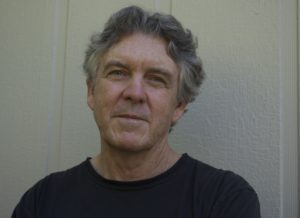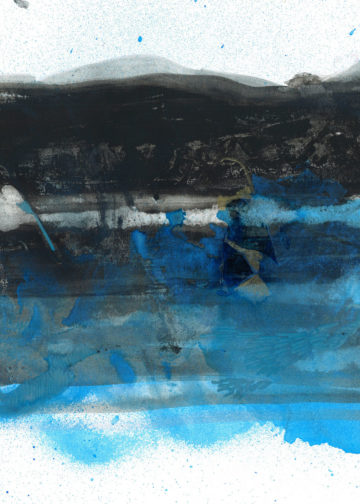Island
What did it mean, he wondered, that their dear friend not only arrived at the island the same day but also stayed fewer than two miles away? It was he—they were sure of it—climbing into that taxi after the ship docked, the blue linen shirt he wore so often, his ragged Targus backpack. After all, this was not some offshore rock a mere seagull-flight from where they lived: it was a hundred miles away. He & his wife & two kids at the all-inclusive “family resort”: lukewarm food & watered-down booze, pool-slides for the kids, silly entertainment in a little amphitheater at night, the poolside sounds of children being chided in seven languages, those no’s and neins and komm hers and venez! and the children, indomitable, a laughter the two of them loved so much, not noise to us at all—just joy, they said, days of it, and in the meantime their friend—whom they hadn’t heard from in six months, somewhere on the island too?
He knew that the other man had always loved the wife, that she loved him: she brightened when he came to visit.
But she was with me the whole time.
For a day or two he thought he skirted the edge of paranoia—wondered if it was just enough for his wife, by arrangement, to be within mere proximity, the Aegean encircling them, the Greek air shared.
And when months after their return the man came to visit—both of the couple happy to see him—they spoke of their trip to that island, “discovered” they were there at the same time, called it a coincidence, and it was then that he felt the force of it between the two, understood that their talking was an artifice, an exercise, and they saw that he saw, and so silence for a long time: each of the three of them as if bound in a cell, and they looked at each other, intimate and grieving.
Chapel
They’d passed it thirty years ago—
You were pregnant…
No—you think I wouldn’t remember if I was pregnant?
Certain, though, it was the mountains of Peloponnesus, two-lane main road hardly main, often only one lane, shrines to dead drivers along the way. The place they stopped, that’s what stayed with them—a neglected chapel hardly bigger than a double bed, vaulted arches, the arches not stone but olive branches embedded in plaster, a window at the end of the nave looking out on the sea, a huge crucifix in front of the window, also olive—gnarled and gray, a Christ-figure so desiccated that for a moment they thought one of the local villagers must have willed his own body to be lashed to that cross.
The chapel was stone on the outside, whitewashed, and the olive nave whitewashed so thinly that the wood-grain of the walls bled through. Six people and one priest would have filled the place. More shrine than chapel, a table in front of the cross, two bare wood benches serving as pews.
He and his wife were young then, and sat together that morning, alone.
They stayed half an hour and no one came, and soon it was apparent the place was claimed by no one, by everyone, was always open, a wayfarer’s place to sit, kneel, look at the sea through the tangled cross, pray.
They continued down the road, visited a war monument, each still talking of the chapel, the way it echoed their voices almost tentatively, of the contorted Christ—forsaken, almost human, and then he said Let’s turn back—we can have dinner at that little town below it, and they did, and they drank ouzo, and though they were in no need of miracle and did not ask for one, they went back to the chapel and moved the pews and spread their sleeping bags on the stone floor, and all night the cold wind came and went, and the grotesque Christ did not come alive, and halfway through the night they were cold and zipped their sleeping bags together.
He reached for her and she said Not on your life, Buster—not with that guy looking down at us, and in the morning they set out, wordless and content, toward Sparta.
To My Friend Bill, in the Ethers
Lines from your writing come back to me. Melancholy accordion on the radio, New Tango, then guitar-runs in homage to Django, I’m staring into the distance on this road I’ve driven so many times between our house and the too-expensive grocery store, and a line of yours comes in: the ceremony eats my strength/drinks I’ve drunk come on… the weight of it, the cost of it, which I among few knew. Caught in the same stupidities—our loyal & loathed companions down the jagged decades—I think of that great last line of your monkey poem—miniature bete noir who in the poem you kill & kill again, at last banish far into the past & you’re at a bar & there he appears, close beside you, Where’re we goin’ tonight?
Miss you, Bill. Wish you were here.
To view the fireworks, then,
she tied me to the oak at the top of the hill. She’d been nervous to go there alone, and knew I hated fireworks. I tried, I really did, to think of their origins—invention, possibility, transformation—tried to respect their carbon, their barium, phosphorous, calcium, but then I got lost in gunpowder, its ultimate effect surely imaginable to the early Chinese inventors.
And the spectators—some vague sense of optimism, I guessed, represented in those starbursts, the whole abecedarium: aerial, barrage, bombette, bottle rocket, brocade, comet, cone, confetti, all the way to sky rocket, wheel, whirlwind & whistle…
And they scared me. I admit. But for this one night—once only, I agreed to play Odysseus tethered to the mast.
Isn’t the sky spectacular enough, I asked, aren’t starbursts in our own heads when we’re angry quite enough? And the crass ambition of it—this one higher, that one bluer, louder… And the goddamn whistling, anyway: do they need to whistle, too?
The fireworks that night, distant, were being shot from a barge in the bay, a costly enterprise in a time when people in the districts they flared above were hungry. Nonetheless, the city fathers thought them necessary, Beacons of Hope.
Fuck beacons, fuck hope, I said, straining at my ropes as the first Silver Salute went off.
Can you just shut up and let me have my moment, she said.
How long does a moment last, I said—does it continue through crossettes, through comets?
I don’t know, she said. Do you remember the time your truck broke down in pouring rain out on Skyline & you called & asked me to come get you? Do you remember you insisted we name our daughter Tiara and I argued & argued but then agreed? Do you remember the time…
OK, OK, I said. Bring on the missiles, bring on the mortars. I’m your prisoner here, and watched the exploding lights, sure they were falling toward me.

Gerald Fleming’s newest book is One (Hanging Loose Press, New York, 2016), prose poems in monosyllabics. Previous books are The Choreographer (prose poems, Sixteen Rivers Press, California, 2013), Night of Pure Breathing (prose poems, Hanging Loose, 2011), and Swimmer Climbing onto Shore, poetry (Sixteen Rivers, 2005). He taught in San Francisco’s public schools for thirty-seven years and has written three books for teachers, including Rain, Steam, and Speed (Jossey-Bass/Wiley). From 1995 to 2000, he edited and published the literary magazine Barnabe Mountain Review, and is currently editing both the limited-edition vitreous magazine One (More) Glass and The Collected Prose & Poetry of Lawrence Fixel. He lives most of the year in Lagunitas, California, and part of the year in Paris.
Cover image: collage by Basseck Mankabu.





















































